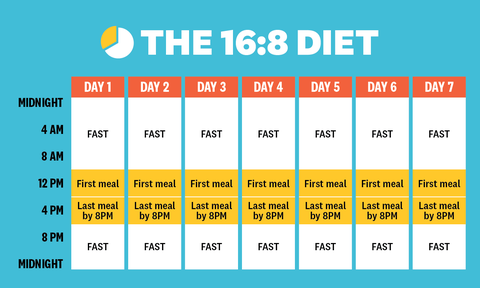
Did I miss the train on this? Fasting? Intermittently?
My experience with fasting thus far has been “fasting by accident”: I get up, am not hungry yet, get sucked into the day and suddenly it’s 2 PM and I want to murder kittens.
Intermittent fasting was the “thing” of the moment, maybe from 2018-2020. And this trend may be on to something. My coworker, Nick, has been doing it. Cool thing is, he seems relaxed about it, like it’s not hard, or stressful (he is mellow though). He reports a slow and steady weight loss (he also climbs 14 flights of stairs at work).
“Fasting is one of the hygienic practices, which gives rest for digestive system & radical cure of disease”
Gangele, Paliwal, 2020 – (article about ayurveda and fasting, v. good)
Wha?
The catch phrase intermittent fasting is a type of eating plan that calls for periods of eating and periods of fasting (in which you only consume water, coffee, and tea). One big draw to fasting is that in theory it’s darn easy. You refrain from eating during specific hours, and otherwise have a reasonably healthy food situation going on. It’s simple, and you can tweak the schedule to fit your needs.
Intermittent fasting can be an excellent way to practice mindful eating habits. Being mindful about eating is more than just the whole eating a single raisin for 30 minutes (actually I think it’s five) thing. When we are mindful, we are AWARE of what is going on; we are present for it. It is when we really consider if we’re hungry before eating, or if we are reaching for food because we’re bored, stressed, upset, etc. Mindfulness enjoys that peach. It savors and appreciates the food, eaten in this moment.
And get this: people report feeling more cravings for healthy food when they fast. This might be because our body feels actual HUNGER, and wants some nutrients coming in. Our bodies are wise. Sometimes just the experience of a true appetite can reset food tastes. Weird, pica-like cravings for broccoli? Who knew.
Fasting in the world of Ayurveda
If ayurveda had a catch phrase, it would be: “depends on the individual” (not catchy but still). What is good for one person might be RILL bad for another. Not surprisingly, ayurveda takes a soft approach to fasting. Ayurveda does not want us to feel deprived (never!) but rather for us to take fasting as an opportunity for the body to get a break. The Bod does not like a constant dump-age of food. The gut needs a chance to rest and to heal. Digestion actually takes a ton of energy. Those big organs need some time to repair themselves without the added strain of a late night Big Mac.
We all consume plenty of toxins in our diet, even if we try to eat “clean”. So much food completely lacks prana (life-force), so our bodies have to work hard to digest and eliminate all the yucky stuff. When we overload with junk, the body can’t keep up and we accumulate ama, which is basically nasty sludge (and considered to be the cause of ALL disease), and we also put a tremendous amount of strain on our agni, or digestive fire. Digestion becomes impaired, more lifeless food comes in and/or we can’t adequately digest the good stuff, ama builds up – no fun.
Ayurvedic fasting is gentle, honey.
One ayurvedic “fast” would be to cut out ONE of the following for a few days: sugar, refined carbohydrates, alcohol, processed foods, genetically modified foods, non-organic foods, leftovers, fast food, “commercial meats”, caffeine. This may sound lame-o, and you may be like: “I will be fasting completely with only water, lemon, and cayenne pepper, BOO.” But really, try cutting out one of those things. It may be harder than it seems.
In ayurveda, fasting isn’t necessarily going without food. A mono-diet approach is more common. This is where you eat just one thing for a period of time – usually a few days to a week. The food eaten for the mono-diet is kitchari (a mung bean and rice dish). Kitchari is easy to digest and all-around comforting. Another ayurvedic fast might look like eating just lightly cooked fruits and vegetables, juices, and kitchari.
Different Doshas Fast Different Ways
Vata-type people should not go without food. You can do a mono-fast but need to be eating. Pitta-types can fast on astringent vegetable juices but not if you get really grumpy – then food is needed. Kapha-types are more encouraged to fast, as they are constitutionally “hardier”. Kaphas are the only type where Ayurveda is ok with a “just water” fast for up to three days, but the person has to be really healthy in the first place for this to be safe.
Below, we will talk specifically about intermittent fasting. In ayurveda, intermittent fasting is almost a given, although it just looks more like not eating between meals or late at night. The intermittent fasting terminology is great because of it’s simplicity and concreteness.
Fasting is used in “Western Medicine” too
Fasting has long been used in hospitals to treat such ailments as pancreatitis, ulcerative colitis, and Crohn’s Disease (gut issues, all). This is commonly called bowel rest and it is pretty much the main treatment, besides steroids (to decrease the inflammation). The bowel rest allows for the bowel to heal itself.
Recent studies have shed light on the role of fasting in “adaptive cellular responses” – meaning, happy, non-mutating cells. It has been shown that cells in an intermittent fasting environment have “a reduction in oxidative damage and inflammation, an optimization of energy metabolism and a bolster in cellular protection” (Longo VD et al., 2014).
Fasting has been shown to help reduce obesity, diabetes, hypertension, asthma and rheumatoid arthritis. It has been shown to prevent and treat diseases as well as reduce inflammation in our tissues. Fasting seems to improve heart health, memory and the “thinking process”. And fasting will supposedly improve physical performance, too.
OK But Don’t Get TOO Excited Here

“And during your eating periods, “eating normally” does not mean going crazy. You’re not likely to lose weight or get healthier if you pack your feeding times with high-calorie junk food, super-sized fried items and treats” (Johns Hopkins, 2022).
This quote is from Johns Hopkins, and in my original notes, it says: “CHANGE THIS TO SOMETHING LESS SHAMING”
But you get the idea.
Intermittent Fasting Schedules are INFINITE, here is ONE!
There are many different fasting schedules that can be followed. There ARE fasts that consist of entire 24 hour periods of fasting, but here’s the deal: only if you are of a hardy constitution should you do this, and not until you have mastered (no side-effects) the 16:8 (below). So if you are an extremely health kapha-type person, then maybe. Pittas – prepare for some crankiness and modify as needed. Hard-core vatas, just stop it. No.
Hey: if you have or have had any disordered eating patterns, please do not do this. Stay away from intermittent fasting, unless you have a counselor or MD working with you. It MIGHT be possible for a person with disrupted eating patterns to feel some safety in having a structured plan, but please figure that out with a professional.
The 16:8 Fast/Eat
All you do is:
Fast 16 hours, eat 8 hours. Eat all meals for the day from noon to 8 PM and fast the rest of the time (tweak hours as needed).

There are many little ways to tweak a personal eating schedule The 16:8 one is basic and a great jumping-off point. Experiment. It doesn’t have to be perfect TODAY. This might be challenging at first, and it could be tweaked to be a 14:10 situation. Easing in. If I have a day that is going to require a flexible eating schedule, I go with that. Flexibility is important, and not just in this arena. Life is for living.
Interestingly, following this kind of eating plan may help with appetite control (counter-intuitive, no?). A recent study in the journal Obesity showed that people who ate only during a six-hour window, compared to following a normal eating schedule, felt less hungry than the control group, even though both groups ate the same amount of calories.

Sign Me Up!
And that’s IT! Of course, remember that making healthy food choices is pretty key to overall health, but this concept makes it easier to wrap one’s head around as a place to start, simply because it is so concrete. My friend Nick says that this fasting thing has helped him make healthier food choices. He is more CONSCIOUS of what is going in. I can vouch for him at work, eating veggies and what-not.
I went too far with fasting. I was emotionally upset one day last week and had no appetite. So I decided that if SOME fasting is good, MORE will be even better and lets just frame it as fasting rather than being upset because then I can ignore the feelings! Phew! That night I ended up in the ER needing headache medicine, nausea medicine and three liters of fluid (after projectile vomiting the entire contents of my body – I had realized, too late, that I was very dehydrated and slammed tons of water. Sorry about your car, Kristine).
Fasting can be a bit intoxicating; heady. Be careful.
Longer periods without food, such as 24, 36, 48 and 72-hour fasting periods, are not necessarily better for you and may be dangerous. Going too long without eating might actually encourage your body to start storing more fat in response to starvation (Johns Hopkins, 2022).

Salient Points
- Can I have cream in my coffee? It may slow down the fat-burning mechanism (the cream will stimulate insulin release), but not TOO much. As a fan of cream in my coffee, I was skeptical but I tried black coffee, and it was fine, I felt Italian somehow (but today I REALLY NEEDED cream in my coffee, so I added a little).
- Solution: I just wait til I’m in the non-fasting portion of my day and then I have a big ‘ol latte.
- I got a headache the first night. Possibly because I was not hungry enough at dinner and didn’t eat enough.
- Solution: had a small handful of almonds and hot milk (totally against the SINGLE rule, LOL, but it was not a huge snack like I might have had).
- I wanted to rebel (and do what I want, dammit! How dare you!)
- Solution: tough one. I struggle with this and perhaps reframing it to remind oneself that oneself has chosen this plan with oneself’s free will would do the trick?
- Stay hydrated
- Solution: carry water around and secure bathroom locations.
- I had insomnia the first night (I cooked and cleaned at 0200, NBD), but this may have been related to the decaf coffee I consumed, pretty late.
- Solution: no coffee, relax and wait it out, will normalize.
- Wanting to eat at night: a thing.
- Solution: Go to bed. Win-win. Can stay up again when used to it. Or, do something different with the evening; shake up the routine. Yahtzee?
- Intermittent fasting takes 2-4 weeks for the body to get used to, and then that Bod loves it.
- Solution: Go slow, maybe start with 14:10 (14 hours fasting and 10 hours eating) at first and every other day.
Be Smart!
Talk to your healthcare provider and don’t do this shit if you are:
- Preggers
- Breastfeeding
- A kid under 18 (probably under 25s) – three square meals, less snacking as kids get older
- Over 80 – three squares
- Diabetic – must eat more regularly; three squares
- Vata-Predominant – three squares
- Angry or Jealous – three squares you rascal
If you have a Disordered Eating history: stay away from this whole thing, and please utilize a professional to help – tough stuff.

Gosh, another awesome post by Jen. Thank you! Informative, ayurved-ish infused, funny, accurate, fair to all sides. I’ve been intermittently fasting most days for a couple of years ( 16-8 with an occasional 24 seems to be what my body likes and what I will maintain). It has absolutely, positively, decreased my cravings and apparently my hemoglobin A1C, a marker of type 2 diabetes that tended to run on the high side of normal is now “fantastic”, to quote my doctor. I decided to try it precisely for glucose control. And hey, if it may be stave away cancer cells as some studies have shown, all the better. It’s not for everyone, but it’s really worked for me. The creamer in my tea, or not, remains a struggle 😊
Thank you for your comment Pastora! That’s so cool that your A1C came down, wow. I can attest to the fact that you look FABULOUS! And I know you have always been high energy but so great to hear that doing this has decreased cravings. I look forward to really getting myself into this. Wondering: what do you do when you are on vacation and/or special days? Do you still go for the 16:8?
Hi. Well, on vacation or special days I’m more likely than not to embrace the -ish- part of me and I don’t necessarily follow the fasting schedule. The question I ask myself then is: what will I be missing out on? If fasting means no ice cream outing with the kids or laughs eating popcorn while watching a movie together, then it’s not worth it and I go ahead and join the fam. But it helps that my family knows “I don’t eat after 7 pm”. Except for when I choose to 😊 it helps to have the expectation around me that I don’t usually eat at certain times. Its also led to a couple of my older kids choosing to stop snacking after dinner, which is a great life long habit, I think.